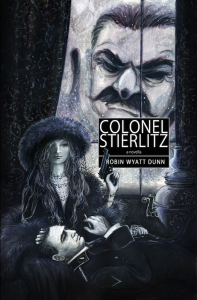Colonel Stierlitz by Robin Wyatt Dunn
-By Terry Melia-
Imagine the text of a novella written in blocks on a Rubik’s cube. The blocks move as you read, shifting and forming stranger patterns which you realise will never form a complete solution… This is how I felt navigating through this weird and amusing fantasy novella: Robin Wyatt Dunn’s Colonel Stierlitz
The back page blurb tells us –
Colonel Stierlitz, a ghostly remnant of Semyonov’s literary character, comes to life in a dream Moscow, tasked with defending his Motherland against all external threats. A zombie Stalin is haunting the city, and Stierlitz’s boss, Semyonov, is treating him strangely…
A Google search of said Colonel reveals Max Otto von Stierlitz was the lead character in a popular Russian book series written in the 1960s by novelist Yulian Semyonov. Stierlitz is the Russian version of our own 007 secret agent with a licence to kill: James Bond. An article on the BBC website examines ‘Was the Soviet James Bond Vladimir Putin’s role model?’
So, this is a fantasy about a fantasy of a fantasy…
At its heart, the novella is a stream-of-consciousness journey; that takes our vodka-infused Colonel (at times in the form of a horse…) from Moscow to Los Angeles via Outer Space. Along the way, he interacts with a crazy assortment of characters including a re-animated Stalin, Swedish secret agents and the original writer Semyonov himself. Of course, the tale includes the usual cliché of the gnome who needs to leave the dragon’s mountain and head off to Hollywood…
Flooding through the stream-of-consciousness is an overwhelming paranoia that someone is watching you – even in your dreams. Rightly or wrongly, from a Western point of view, the Russians are mostly depicted as the Bogey men with Big Brother spies jealously witnessing our freedoms. My thoughts of Russian politics conjure an image of KGB agents raiding dissident’s homes in the early hours or the latter day FSB hit squads who allegedly murdered their own spy Alexander Litvinenko leaving him to die a horrible death from polonium poisoning in London in 2006.
The opening lines focus on this paranoia:
Colonel Stierlitz eyes the microphone. This will be the last time I do this, he thinks.
“Is the Soviet propaganda machine on?” he asks the microphone.
“Yes, I’m on,” the microphone says.
Although the majority of the text is extremely well written, there are occasional jarring typos that should have been picked up by an editor. I found the use of a ‘cel phone’ particularly distracting. There’s also an occasional error in viewpoint and tense:
“It was you who arrested me!” Max was standing now, shouting into his phone. “You no good thug!”
“Enough Maxy!” Ekaterina announced. “No more phone for you tonight.” She took the cel phone away from me.
There are passages that fall completely flat. We get a taste of this with the prelude to the opening text:
Stierlitz opened a door. The lights went on. Stierlitz
closed the door. The lights went out. Stierlitz opened the
door again. The light went back on. Stierlitz closed the door.
The light went out again.
“I’m a refrigerator,” concluded Stierlitz.
— traditional Russian joke
Overall, I really enjoyed this read, allowing my imagination to be dragged all over the place at a frantic tempo. I’d recommend it highly although I’m certain that a lot of readers would not stay the distance with the confusing plotline.
The author’s impressive website details quite an extensive catalogue of work including poetry and film productions.
Now, you’ll have to excuse me for a while as I seek out the comfort of a darkened room for a day or so…

Reviewed by Terry Melia — Terry is the author of Tales from the Greenhills which has recently been produced as an audio-book. His day job is in IT. A voracious reader and frequent gamer, Terry is currently working on Greenhills part 2 and 3. Come and say hello on Twitter: @FromGreenhills






